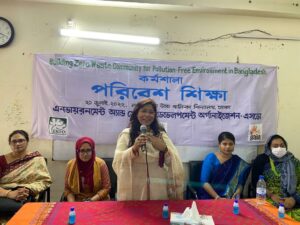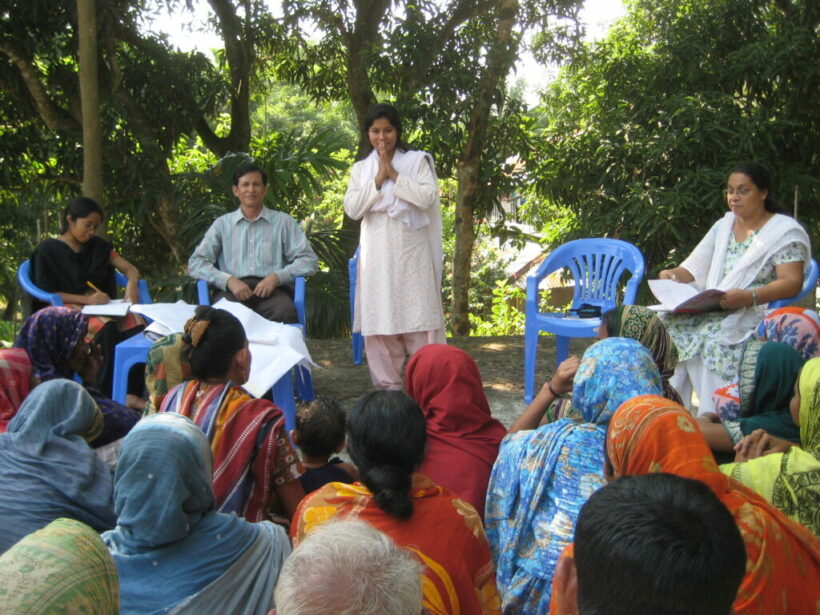Siddika Sultana: Moving Bangladesh to a Future Worth Smiling About
by Marco Sumayao

It’s hard to imagine Siddika Sultana without a smile on her face. The Executive Director of Environment and Social Development Organization (ESDO) has a lot to be happy about despite the often tiring work involved in lobbying for environmental policy reforms and initiatives in Bangladesh. She enjoys the support of highly-engaged colleagues, youth group collaborators occasionally surprising her with flowers, and quiet moments over a cup of afternoon tea.
One of her biggest sources of joy, however, has to be the sterling track record she’s developed through years as an advocate for women’s and children’s rights, and the environment.
Siddika has virtually spent her entire career uplifting the lives of people in vulnerable communities. In 1997, she worked closely with the Bangladesh Women’s Health Coalition to help promote gender equality in workplaces through women empowerment initiatives. In the development field, she also helped raise awareness among adolescents in slum areas about HIV-AIDS — an experience that allowed her to truly connect with people and deepen her resolve to champion their causes.
“The young ladies, they loved me too much,” she recalled, giggling. “If I missed one day, they would just be waiting for me. So I was thinking to myself, ‘How do I deliver this message the easy way?’ ’Easy way’, [meaning] not only in their language but also just to make them feel that this is their issue, to make them think about themselves.”
It was the start of her people-centered approach to her advocacies, tying human needs to the creation of policies that would address them. When she lobbied for country-wide restrictions on the use of lead-based paints in 2008—a process that took nearly 11 years to achieve success—it was this approach that won over policymakers and led to a collaborative effort to improve national policy.
“Who are the main players? Who are the main stakeholders? The paint manufacturers and the Paint Manufacturers Association. So we involved them in this process,” Siddika shared. “And we showed them the vulnerability of the children with exposure to the lead in their paints.”
By 2018, the Bangladesh government agreed to impose clear limitations on the maximum amount of lead allowed in decorative paints — a massive win for Siddika and other advocates of the cause. The next step, she says, is to work towards a complete ban altogether, both locally and across the world.
Over time, more and more ecological issues would overlap with her other advocacies, and Siddika felt that championing causes for the environment were something that would come naturally to her. Some of these issues have, in one way or another, been involved with her personal history.
In 1998, Bangladesh suffered catastrophic floods. Over 75% of the country was inundated, with flooding lasting up to 20 days in some areas. More than 30 million people lost their homes, and an estimated 700,000 hectares of agricultural land was devastated. Siddika saw first-hand how plastic waste played a role in the disaster.
“That time, I was living with my parents in the northern part of Bangladesh, a rural area,” she shared. “In my hometown, there’s a big river. The river was overflowing because of these plastic bags.”
The clogging of drainage systems by discarded polythene bags was identified as a major cause of the floods. According to estimates, nearly 80% of flooding in Dhaka, the country’s capital, was due to the clogging caused by these bags. The plastic had also managed to slow down the flow of water in rivers, leading to flooding in riverside areas.
The calamity led to increased discussion over the use of polythene bags, and ESDO was among the organizations leading the call to ban them. Siddika had been volunteering with them as a student since 1990 and was working hard to get people to understand the importance of this campaign. In 2003, thanks to the efforts of ESDO and other organizations, Bangladesh became the first country in the world to ban the use of polythene bags.
Today, Siddika is helping the Zero Waste advocacy grow in Bangladesh, overseeing the development of Zero Waste communities in three pilot areas. One of the key components of these communities is a strong push for food composting — a practice that Siddika has been familiar with since her youth.
She shared that she used to witness her grandmother putting vegetable discards in “some type of vegetable garden.”
“She’d just clean everything and put the food waste] there. One day, I asked her, ‘Why are you always just putting the vegetables in the field?’ She just told me, ‘This is not waste. It becomes fertilizer. After three or five days, this will mix with the soil.’”
From then on, Siddika always saw food waste as a resource rather than something to discard. “We can just collect it. We can just use it in agriculture just like in my grandmother’s kitchen garden.”
When the campaign for Zero Waste in Bangladesh began, there was some resistance to the idea. People simply didn’t understand the benefits of going Zero Waste. Siddika, however, found ways to engage her audience in ways that mattered to them. She showed them how composting allowed their fields and rooftop gardens to thrive, giving them more food sources and additional means of livelihood. Not only do they get to grow fresh fruit and vegetables, but they’re also able to sell their excess produce at their local markets. It’s also had a positive impact on their general health — with more vegetation growing, the air quality in these Zero Waste communities has improved.
Despite these successes, Siddika understands that there’s still a lot of work to do in Bangladesh. While ESDO and other environmental organizations enjoy the support of their local governments, there’s a lot of improvement needed in terms of policy.
“Bangladesh has yet to enforce a proper framework for the disposal of waste and segregation, and we are continuously advocating for it,” she explained.
In the meantime, she and her colleagues at ESDO are working tirelessly to educate their community on how to implement a Zero Waste lifestyle at home, with a slight tweak on the Three Rs principle: “We introduced the core concept which is Four Rs,” she said. “You already know ‘Reduce, Recycle, and Reuse’ very well, but we also introduced ‘Refuse.’ If we’re not able to manage it, we cannot produce it or use it. Why should we just introduce these in our society? So we leave it. We just refuse it.”
As her community continues to get more and more engaged in the Zero Waste advocacy, Siddika is working to keep their environment safe from pollutants and hazardous chemicals in several ways. Not only is she involved in ESDO’s campaign to impose limits on single-use plastics, she’s also part of initiatives to ban the use of mercury in dental amalgams.
All her work — from reproductive health and women’s rights to workplace conditions and the Zero Waste advocacy — is meant to help build a safer, healthier Bangladesh for generations to come. She’s championed and will continue to champion all sorts of advocacies because she “wants to help create a country she’d be proud to leave behind for others.”
“I’m really happy with this process. I’m really happy when our advocacy gets a [good] result for the nation,” she said. “Being an environmentalist and a good advocate is to create something for our nation, and for our next generation.”
Despite the many challenges and long, long hours her advocacy work presents, Siddika manages to still be as happy as she ever was. Quick to giggle, she is a warm conversationalist. Perhaps it’s because, deep down inside, she knows that every step of her journey moves Bangladesh towards a future worth smiling about.










